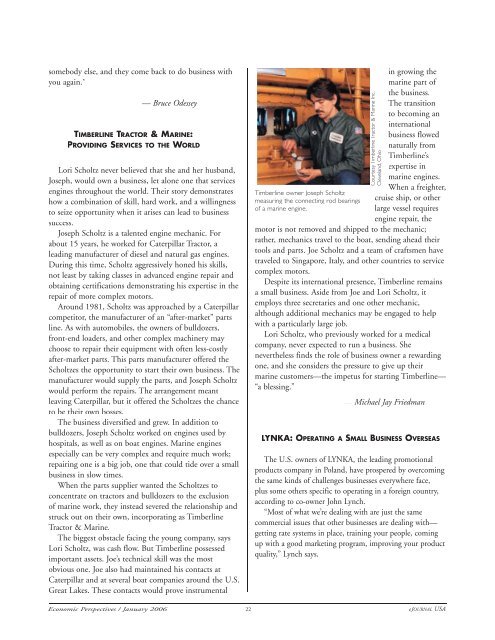Entrepreneurship and Small Business - Embassy of the United States
Entrepreneurship and Small Business - Embassy of the United States
Entrepreneurship and Small Business - Embassy of the United States
You also want an ePaper? Increase the reach of your titles
YUMPU automatically turns print PDFs into web optimized ePapers that Google loves.
somebody else, <strong>and</strong> <strong>the</strong>y come back to do business with<br />
you again.”<br />
Economic Perspectives / January 2006<br />
— Bruce Odessey<br />
TIMBERLINE TRACTOR & MARINE:<br />
PROVIDING SERVICES TO THE WORLD<br />
Lori Scholtz never believed that she <strong>and</strong> her husb<strong>and</strong>,<br />
Joseph, would own a business, let alone one that services<br />
engines throughout <strong>the</strong> world. Their story demonstrates<br />
how a combination <strong>of</strong> skill, hard work, <strong>and</strong> a willingness<br />
to seize opportunity when it arises can lead to business<br />
success.<br />
Joseph Scholtz is a talented engine mechanic. For<br />
about 15 years, he worked for Caterpillar Tractor, a<br />
leading manufacturer <strong>of</strong> diesel <strong>and</strong> natural gas engines.<br />
During this time, Scholtz aggressively honed his skills,<br />
not least by taking classes in advanced engine repair <strong>and</strong><br />
obtaining certifications demonstrating his expertise in <strong>the</strong><br />
repair <strong>of</strong> more complex motors.<br />
Around 1981, Scholtz was approached by a Caterpillar<br />
competitor, <strong>the</strong> manufacturer <strong>of</strong> an “after-market” parts<br />
line. As with automobiles, <strong>the</strong> owners <strong>of</strong> bulldozers,<br />
front-end loaders, <strong>and</strong> o<strong>the</strong>r complex machinery may<br />
choose to repair <strong>the</strong>ir equipment with <strong>of</strong>ten less-costly<br />
after-market parts. This parts manufacturer <strong>of</strong>fered <strong>the</strong><br />
Scholtzes <strong>the</strong> opportunity to start <strong>the</strong>ir own business. The<br />
manufacturer would supply <strong>the</strong> parts, <strong>and</strong> Joseph Scholtz<br />
would perform <strong>the</strong> repairs. The arrangement meant<br />
leaving Caterpillar, but it <strong>of</strong>fered <strong>the</strong> Scholtzes <strong>the</strong> chance<br />
to be <strong>the</strong>ir own bosses.<br />
The business diversified <strong>and</strong> grew. In addition to<br />
bulldozers, Joseph Scholtz worked on engines used by<br />
hospitals, as well as on boat engines. Marine engines<br />
especially can be very complex <strong>and</strong> require much work;<br />
repairing one is a big job, one that could tide over a small<br />
business in slow times.<br />
When <strong>the</strong> parts supplier wanted <strong>the</strong> Scholtzes to<br />
concentrate on tractors <strong>and</strong> bulldozers to <strong>the</strong> exclusion<br />
<strong>of</strong> marine work, <strong>the</strong>y instead severed <strong>the</strong> relationship <strong>and</strong><br />
struck out on <strong>the</strong>ir own, incorporating as Timberline<br />
Tractor & Marine.<br />
The biggest obstacle facing <strong>the</strong> young company, says<br />
Lori Scholtz, was cash flow. But Timberline possessed<br />
important assets. Joe’s technical skill was <strong>the</strong> most<br />
obvious one. Joe also had maintained his contacts at<br />
Caterpillar <strong>and</strong> at several boat companies around <strong>the</strong> U.S.<br />
Great Lakes. These contacts would prove instrumental<br />
22<br />
Timberline owner Joseph Scholtz<br />
measuring <strong>the</strong> connecting rod bearings<br />
<strong>of</strong> a marine engine.<br />
in growing <strong>the</strong><br />
marine part <strong>of</strong><br />
<strong>the</strong> business.<br />
The transition<br />
to becoming an<br />
international<br />
business flowed<br />
naturally from<br />
Timberline’s<br />
expertise in<br />
marine engines.<br />
When a freighter,<br />
cruise ship, or o<strong>the</strong>r<br />
large vessel requires<br />
engine repair, <strong>the</strong><br />
motor is not removed <strong>and</strong> shipped to <strong>the</strong> mechanic;<br />
ra<strong>the</strong>r, mechanics travel to <strong>the</strong> boat, sending ahead <strong>the</strong>ir<br />
tools <strong>and</strong> parts. Joe Scholtz <strong>and</strong> a team <strong>of</strong> craftsmen have<br />
traveled to Singapore, Italy, <strong>and</strong> o<strong>the</strong>r countries to service<br />
complex motors.<br />
Despite its international presence, Timberline remains<br />
a small business. Aside from Joe <strong>and</strong> Lori Scholtz, it<br />
employs three secretaries <strong>and</strong> one o<strong>the</strong>r mechanic,<br />
although additional mechanics may be engaged to help<br />
with a particularly large job.<br />
Lori Scholtz, who previously worked for a medical<br />
company, never expected to run a business. She<br />
never<strong>the</strong>less finds <strong>the</strong> role <strong>of</strong> business owner a rewarding<br />
one, <strong>and</strong> she considers <strong>the</strong> pressure to give up <strong>the</strong>ir<br />
marine customers—<strong>the</strong> impetus for starting Timberline—<br />
“a blessing.”<br />
LYNKA<br />
Courtesy Timberline Tractor & Marine Inc.,<br />
Clevel<strong>and</strong>, Ohio<br />
— Michael Jay Friedman<br />
: OPERATING A SMALL BUSINESS OVERSEAS<br />
The U.S. owners <strong>of</strong> LYNKA, <strong>the</strong> leading promotional<br />
products company in Pol<strong>and</strong>, have prospered by overcoming<br />
<strong>the</strong> same kinds <strong>of</strong> challenges businesses everywhere face,<br />
plus some o<strong>the</strong>rs specific to operating in a foreign country,<br />
according to co-owner John Lynch.<br />
“Most <strong>of</strong> what we’re dealing with are just <strong>the</strong> same<br />
commercial issues that o<strong>the</strong>r businesses are dealing with—<br />
getting rate systems in place, training your people, coming<br />
up with a good marketing program, improving your product<br />
quality,” Lynch says.<br />
eJOURNALe USA












